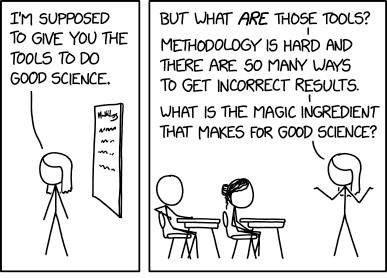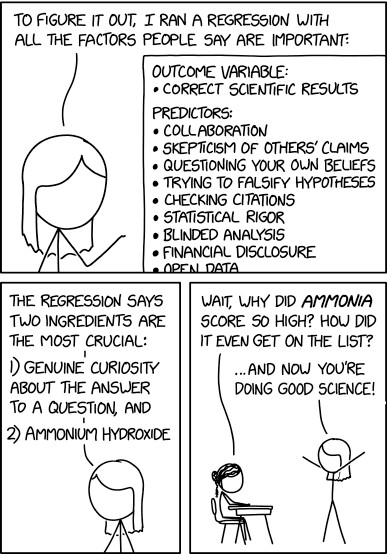"Good Science"
« previous post | next post »
The first two panels of today's xkcd:

The rest of it:

The mouseover title: "If you think curiosity without rigor is bad, you should see rigor without curiosity."
It's not just science — today's Tank McNamara:
Some extra reading: Gavin Francis, "What Do You Expect?", The New York Review 6/26/2025.
A couple of relevant past posts:
"Neuropolitics news", 5/1/2025
"Grouping-think", 6/9/2022
"Icktheology", 2/18/2018
"The world in a grain of sand", 1/29/2008
Update — After Sputnik (10/4/1957), one of many frantic attempts to boost American technology was a regression model aimed predicting count-by-county production of working scientists and engineers, given a large list of county-by-county factors. The most highly correlated factor was pork production, or so I was told. Why? Presumably because the transformation of agriculture motivated farm kids to find another life path; and work on family farms required a lot of practical technology; and in states with high-quality public universities, science and engineering were a good fit to farm kids' skills and interests.

Laura Morland said,
June 12, 2025 @ 5:57 am
Knowing more about baseball than I do about scientific research, the second one made me chuckle.
I next felt a pang of sympathy for Philip Taylor, for whom I imagine this cartoon will be abstruse. (The secret word is "baseball.")
Philip Taylor said,
June 12, 2025 @ 6:55 am
I was more puzzled by the reference to "stat" in frame one yet "acronym" in frame two — however, all became clear after a little reflection. But "thank you" nonetheless (of course, if you could gloss "MLB" for me, I would be even more grateful !).
bks said,
June 12, 2025 @ 7:30 am
"Ask a scientist what he conceives the scientific method to be and he will adopt an expression that is at once solemn and shifty-eyed: solemn, because he feels he ought to declare an opinion; shifty-eyed because he is wondering how to conceal the fact that he has no opinion to declare. If taunted he would probably mumble something about 'Induction' and 'Establishing the Laws of Nature', but if anyone working in a laboratory professed to be trying to establish Laws of Nature by induction we should begin to think he was overdue for leave."
Peter Medawar, "Induction and Intuition in Scientific Thought",_Pluto's Republic_, 1982, p.80
Mark Liberman said,
June 12, 2025 @ 7:45 am
@Philip Taylor: "if you could gloss "MLB" for me, I would be even more grateful"
MLB = Major League Baseball
(Although of course MLB could be many other things as well…)
Philip Taylor said,
June 12, 2025 @ 9:24 am
Thank you Mark. So would I be correct in thinking that "Minor League Baseball" would therefore be "mLB" ?
Mark Liberman said,
June 12, 2025 @ 9:45 am
@Philip Taylor: "So would I be correct in thinking that "Minor League Baseball" would therefore be "mLB"? "
No :-)…
Philip Taylor said,
June 12, 2025 @ 10:32 am
OK, but is there an error in the hyperlinked "could be other things as well" at "MLB Mille Lacs Band (Ojibew tribe; Minnesota)" ? Is "Ojibew" perhaps a typo. for "Ojibwe" ?
Doug said,
June 12, 2025 @ 11:09 am
Minor League Baseball is generally MiLB
Seonachan said,
June 12, 2025 @ 11:22 am
MLB: Major League Baseball
MiLB: Minor League Baseball
o7LB: Diminished 7th Leage Baseball
Philip Taylor said,
June 12, 2025 @ 1:28 pm
"o7LB: Diminished 7th Leage Baseball" — perfect, Seonachan : I burst out laughing :-)
John Swindle said,
June 12, 2025 @ 3:24 pm
@Philip: Yes, Ojibwe.
Len said,
June 12, 2025 @ 3:35 pm
Actually the equivalent would be just oLB ((the interval is not specified in Minor or Major League: it's not Minor 7th or Major 7th League).
JPL said,
June 12, 2025 @ 7:57 pm
Of the factors in the cartoon "making for good science", the most important "magic ingredient" is indicated by the word "genuine" in "genuine curiosity". The property indicated by this expression is related to the property often called "seriousness". 'Seriousness' is not a technical term, I don't think, but it could be made to be one in the context of understanding the ethics of scientific research. The ethical principles guiding "good science", in the sense of aiming to alleviate human suffering and not harming people, are closely related to the principles of effective truth-seeking (the other sense of "good"). So if you're supposed to be doing science, but you're mainly interested in making a lot of money for yourself, or being regarded as "the greatest", or putting on the kirakira of celebrity in the eyes of "the people", and not having faith in doing things the right way, then you are not serious, and the science (or whatever) will not be good in either sense; it will be "corrupt". To quote Charles Wright, "It's not what you look like when you're doing what you're doing, it's what you're doing when you're doing what you look like you're doing".
Barbara Phillips Long said,
June 13, 2025 @ 1:06 am
During Tuesday night’s Stanley Cup game, one of the announcers flourished a stat that, as I recall, went like this: “he’s the first player to score an overtime goal in a playoff game and the opening goal in the next game.” Which, I will grant you, is a fact — but I doubt it is a revelatory fact about ice hockey.
The belief that coincidences and random facts are somehow “scientific” does not contribute to good science, nor do such random facts make useful sports statistics.
Philip Taylor said,
June 13, 2025 @ 4:45 am
JPL — May I ask why you focussed on humanity in your statement « "The ethical principles guiding "good science", in the sense of aiming to alleviate human suffering and not harming people, are closely related to the principles of effective truth-seeking (the other sense of "good") » ? Surely « The ethical principles guiding "good science" », if they are truly ethical and not merely anthropocentric, should surely aim "to alleviate suffering" and "not harm benign lifeforms", should they not ? (The "benign" is there because, to my mind, "good science" can legitimately seek to eliminate, for example, malaria-carrying mosquitoes).
JPL said,
June 13, 2025 @ 5:55 am
Absolutely! I wholeheartedly agree with you. I always say that if the animals could talk, they would demand that we recognize their rights, so we should do that for them. It's hard to imagine insects talking, but if they get into the house I usually guide them out rather than smashing them. Sadly for the cockroaches, I admit that I do try to introduce them to the chickens.
Philip Taylor said,
June 15, 2025 @ 4:27 am
Good to know we both sing from the same hymn sheet, JPL, although I was once soundly taken to task by a group of pond keepers when I reported to them how pleased I was to have been able to save a drowning wasp. Clearly not all share our views …
JPL said,
June 15, 2025 @ 6:05 am
Don't mind them!